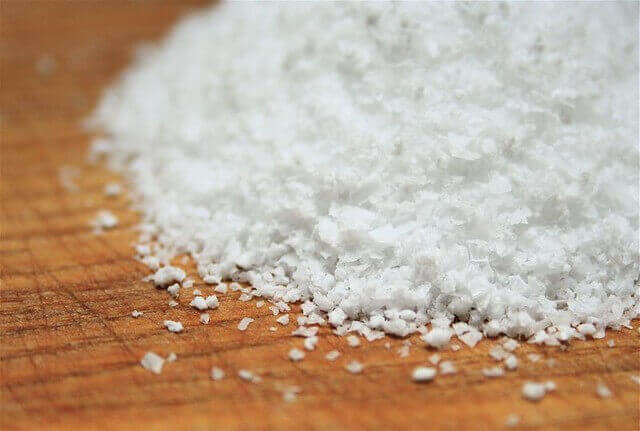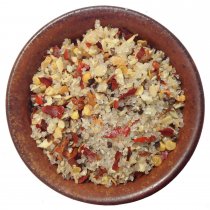Salt is an essential ingredient in most of the food that we consume. The difference in its types is what makes them so valuable. Among different kinds of salt available, regular cooking salts are responsible for adding flavour. Black salt contributes to adding smell and taste, curing salts preserve meat, and rock salt makes our ice cream taste even better.
But, regular high usage of iodised salt affects our body. Substances like calcium silicate or sodium ferrocyanide and iodine are present in salts. When consumed in high dosage, they hamper bodily function. So, it’s best to keep kosher salts around instead as they are considered the healthiest salts.
Table of Contents
What is kosher salt in Australia?
They are an edible flat grained form of salt with a diamond crystal structure and coarser grains. They’re well-known as Koshering salt.
It comes in more refined grains and has a lighter taste than regular table salt, adding subtle flavour to your food without changing the texture much.
Morton Kosher Salt and Diamond Crystal Salt are the two leading kosher salt brands. Morton Kosher salt is coarser than ordinary table salt but less than the Diamond Crystal.
It’s general, all-purpose everyday salt rather than for some fancy salt recipes.
Note: For more articles, read our blog.
How is Kosher Salt made?
Kosher salt is coarse-grained salt, mainly sodium chloride and is extracted from the crystals instead of other finer salts. It is originated from deposits in salt mines and comes in both flat and pyramidal shapes depending on its evaporation process.
It’s usually not iodised since it gets rid of impurities during its production process. But some manufacturers may include an anti-caking agent for easy shaking in salt shakers or on tables at restaurants and households.
On the contrary, table salt contains iodine, while Celtic salt and Himalayan Pink salt contains minerals like iron. Similarly, gourmet sea salts, black and celery salt, incorporate herbs and spices to enhance the flavour. Mixing herbs to salt adds distinct flavours to the dishes.
Now you can buy kosher flake sea salt and kosher salt clocks around the stores in Australia.
Why is it called Kosher?
It is a type of gourmet salt. People have been using it for centuries, and it gets its name from the Jewish practice of “koshering” meat.
Kosher laws dictate that you have to slaughter animals in a specific way. The koshering process usually involves using kosher salts, not contaminating the meats when drawing out the blood and moisture from meat for consumption purposes.
It’s primarily used for drawing out blood from the meat. It’s misleading, though. Kosher tradition is not about preserving or cleansing the food in any way. Instead, it has more to do with how animals get slaughtered and what they’re allowed to eat before slaughter.
Jews refer to this as kosher because they only want pure salt. They are not using the additive-containing table salt or salts from other sources. However, the processing industry isn’t allowed to add anything without explicit instructions from a rabbi or other Kashrut (Jewish dietary law) authority.
What is kosher salt called in Australia?
Confused? Don’t worry. It’s just a little misleading.
Technically anything with salt is kosher, but the refining process can change it. For example, rabbis have certified some salts to be fit for consumption. These products would be fine in flavour and colouring. But when it comes down to production, most of them will be pure white or grey anyway.
If you’ve ever come across something labelled “Kosher Salt” in the grocery store, it’s just regular salt. It may be certified kosher by a rabbi from an organisation. Still, they’re essentially identical when it comes down to flavour and complexion.
Some people choose not to buy kosher salt because they get confused due to its misleading name. While technically, you can use any pure form of edible salt for the cooking process.
Since there are many kinds of salt, some brands may require certification by an organisation. For example, if you want to cook them according to Jewish dietary guidelines and enjoy their full culinary potential, your food’s affair with salt has to follow kosher tradition.
Kosher salt’s rich flavour and palatability make it perfect on your next grilled chicken dish. A pinch of salt can make a real difference in how your dish tastes.
How does Kosher Salt taste?
It is a tastier and more flavorful alternative to most table salts. There is no discernible difference between kosher-certified salt and non-certified kosher salt taste. Brands of salt vary.
They both have a light flavour that enhances food without overwhelming it with sodium content or intense flavours.
Why do chefs prefer kosher salt?
With its larger crystals size and lower levels of sodium chloride, Kosher salt has an advantage vs table salt. It is one of the most popular choices over other kinds of cooking salts for chefs and is used in spice rubs or brines and pickling to adjust taste without making a dish too salty.
Chefs prefer it as a herb salt recipe on seafood dishes, brines with vegetables such as beans, cabbage, carrots, celery root, and pickling foods, including cucumbers and eggs (hard-boiled), onions and garlic cloves.
It has a pleasant subtle flavour compared to ordinary table salt. It is helpful for culinary traditions like koshering meat and other purposes where the chef needs to remove blood from the surface of the food as it dissolves quickly in water or vinegar. Blood gets absorbed by salt rather than staying on top like regular iodised-table salt.
Note: To know more about different products, visit our shop page.
What are its uses?
Regular kitchen salt has an anti-clumping agent to keep it from clumping, leading to health issues. The difference between salt and kosher is that latter is usually free of these agents and have less iodine, which is good for you.
Making kosher salt crystals from seawater does not include any additives like anti-clumping agents or iodine, which can be harmful to your health.
Iodine in table salt can cause thyroid problems if too much builds up in our bodies over time. Thus, most people find it necessary to switch back and forth when cooking recipes that call for different types of salt since some require a higher concentration than others. For example, baking requires more salt.
Make sure your kitchen contains a jar of coarse-grained kosher salt and finer table salt. It ensures that no matter what kind everyone prefers, everyone will still be able to catch whatever the taste buds desire.
Kosher Salt Substitute
You can never have too many forms of salt in your kitchen. Then, if you do, instead of running to the store for your kosher salt recipe when you run out of it, you can swap out sea or table salts.
Flaky sea salts have similar grain consistency and flavour, but the grains of salt is more refined. Therefore, it would be best not to use it on a 1:1 ratio. For example, if a recipe requires one teaspoon of kosher salt, use 1/2 teaspoon of coarse salt or table salt instead.
Where can you buy Kosher salt?
You have come to the right place if you wondered where you could buy kosher salt in Australia. You don’t have to buy Morton salt if you don’t want to. There are plenty of other brands that could meet your need and suit your budget.
As a leading brand, Baker and Bakersalts have two products dedicated to Kosher Salt in our store, Umami fine Kosher salt rub and lightly smoked kosher salt. These are our top-of-the-line products at a competitive price with no compromise in their quality.
Make your dish more delicious and flavour rich with different cooking salts, available at our store Baker and Baker Salts.
Product quality and customer satisfaction is our highest priority.
Also, if you want to know more about other types of salt and salt accessories, visit our salt accessories page.
Check out our top picks for Kosher salts
-
 Umami Fine Kosher Salt Rub$5.50 – $13.00
Umami Fine Kosher Salt Rub$5.50 – $13.00 -
 Lightly Smoked Kosher Salt$5.50 – $17.50
Lightly Smoked Kosher Salt$5.50 – $17.50







